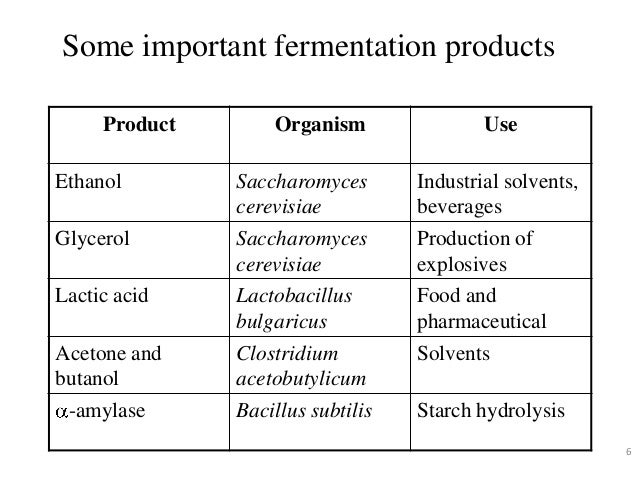Imagine a world without sourdough bread, the tangy flavor of kimchi, or the satisfying fizz of a kombucha. It’s hard to fathom, isn’t it? These beloved foods and drinks owe their unique characteristics to a fascinating process: fermentation. It’s a natural transformation of organic materials, driven by the invisible forces of microscopic organisms – yeasts and bacteria. Fermentation, often described as a kind of “controlled decay,” has been a cornerstone of food preservation for millennia, but its implications reach far beyond the kitchen.

Image: recipepes.com
This article explores both the advantages and disadvantages that come with fermentation, unveiling its multifaceted impact on our food, health, and even the environment. By understanding the nuances of this ancient technique, we can better appreciate its contributions to our lives and make informed choices when it comes to incorporating fermented products into our diets and lifestyles.
A Deeper Dive into Fermentation: Unveiling the Process and its Applications
Fermentation, at its core, is an anaerobic process, meaning it happens in the absence of oxygen. It occurs when microorganisms, predominantly yeasts and bacteria, consume sugars and convert them into various byproducts. The type of microbe and the specific ingredients involved determine the final product – a delightful array of flavors, textures, and beneficial compounds.
The Advantages of Fermentation
- Preservation and Shelf Life: Fermentation has been a time-honored method of preserving food. By transforming food’s chemical makeup, microorganisms create an environment less hospitable to spoilage, extending its shelf life significantly. From pickled vegetables to cured meats, fermentation has played a crucial role in ensuring food security throughout history.
- Enhanced Nutrition and Digestibility: Fermentation can boost the nutritional value of food. In the process, microorganisms break down complex carbohydrates, making them easier for our bodies to digest. Additionally, fermentation increases the bioavailability of certain nutrients, allowing our bodies to readily absorb them. Yogurt, for instance, is a source of probiotics – live bacteria that promote gut health, improve digestion, and may even bolster our immune system.
- Flavor Enhancement: The magic of fermentation lies in the creation of unique and captivating flavors – a testament to the creativity of microbes. The lactic acid produced during fermentation contributes to the tartness in sauerkraut, while the yeasts in bread create its distinct aroma and airy texture.
- Reduced Food Waste: Fermentation breathes new life into food that might otherwise end up in a landfill. By turning surplus fruits and vegetables into delicious and nutritious products, fermentation plays a vital role in reducing food waste and promoting sustainability.
- Emerging Applications: The applications of fermentation extend far beyond food. In the realm of medicine, scientists are exploring its potential for producing biofuels, pharmaceuticals, and even biodegradable plastics.
The Disadvantages of Fermentation
- Allergens and Safety Concerns: For individuals with specific food sensitivities, fermented foods can pose a challenge. Certain fermentation processes can trigger allergic reactions in people with sensitivities to yeast, mold, or gluten. Furthermore, the fermentation process itself can introduce potentially harmful bacteria if proper hygiene and safety measures aren’t followed.
- Limited Shelf Life: While fermentation extends the shelf life of food, it’s important to recognize that fermented products still have a finite lifespan. Improper storage can lead to spoilage, so it’s crucial to store fermented foods according to the manufacturer’s instructions.
- Palatability: The acquired taste of fermented foods can be a barrier for some individuals. The pungent aroma and tangy flavors associated with fermented foods, like kimchi and cheese, might not appeal to everyone’s taste buds.
- Potential for Undesirable Changes in Texture: Fermentation can alter the texture of food in ways that may not be desirable. For example, fermented vegetables can become soft and mushy, while some cheeses develop a strong, pungent odor.
- Environmental Concerns: Although fermentation can contribute to reducing food waste, some methods can have environmental implications. For instance, industrial fermentation processes may require significant energy inputs and produce wastewater, requiring careful management.

Image: www.slideshare.net
Expert Insights and Actionable Tips
Experts in food science and nutrition generally recommend incorporating a diverse array of fermented foods into your diet. By choosing products from reputable sources and adhering to proper storage instructions, you can reap the benefits of fermentation without compromising your health. Additionally, exploring DIY fermentation can be an enriching experience, expanding your culinary skills and deepening your understanding of this fascinating process.
Classify The Following Advantages And Disadvantages Of Fermentation
In Conclusion
Fermentation, a vibrant tapestry of microbe-driven transformations, has been a cornerstone of human civilization. It’s a testament to the power of nature and our ingenuity in harnessing its forces. By understanding the advantages and disadvantages of fermentation, we can make informed choices about our food and appreciate the intricate network of life that makes this process possible. So, next time you enjoy a slice of sourdough bread or a dollop of yogurt, take a moment to acknowledge the microscopic world working its magic to bring you deliciousness and health.
Let us know your experiences with fermented foods in the comments below! What are your favorite fermented products, and how do you incorporate them into your diet?






